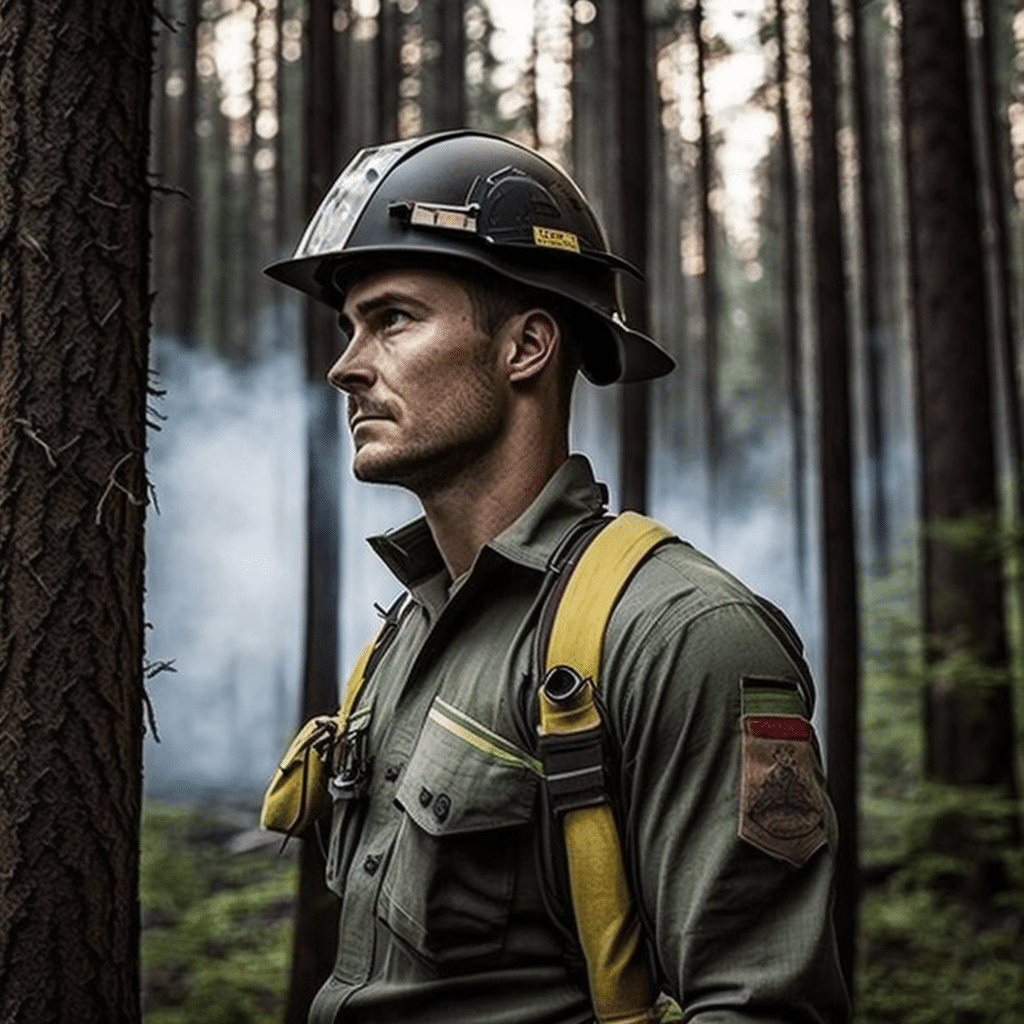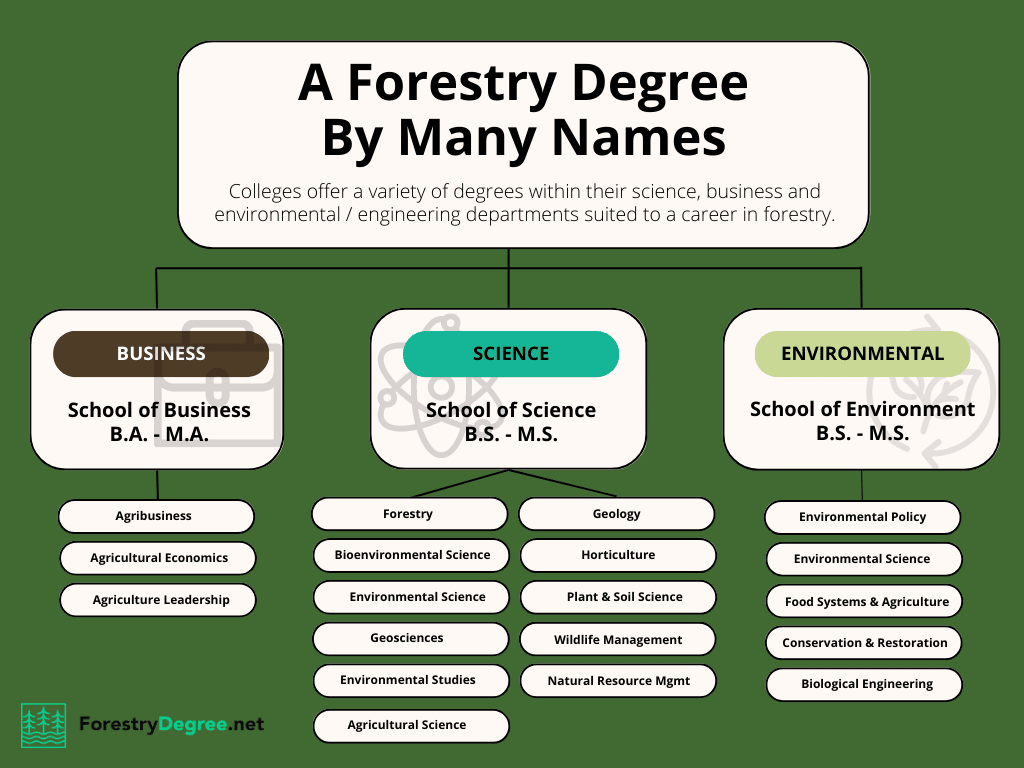
Real Forestry Professionals. Honest Answers.
More Answers From Forestry Professionals
4 Steps to Getting a Career in Forestry
Step 1
Pre-Requisites
High school diploma or GED.
Step 2
Earn a Degree
Earn a Bachelors or Masters in Forestry or related degree.
Step 3
Certification
Obtain optional certification through the FSC or SAF.
Step 4
Seek employment
Salary range, $61,026 – $88,630 (BLS 2021).
Best Online Forestry Degree Programs
Forestry degree programs are offered at the certificate, bachelors and master’s degree levels. Offered in both campus and online forestry degree formats, a degree in forestry can lead to careers in conservation, wildlife management, agriculture, natural resources, and environmental science.
Forestry degree programs are also called: Environmental Management & Policy, Environmental Science, Natural Resources and Sustainability, among others. If you’re interested in a career working in the outdoors, or with plants and ecology, wildlife and agriculture, or on sustainability issues, a forestry degree is an excellent choice. Below you’ll find accredited online forestry degree programs that will prepare you for your career in forestry and conservation science:
Want More Options? See Our Complete Directory of Forestry Programs
What Our Experts Say About Online Forestry Programs
[With environmental or forestry] you can get your degree online, [which] is great if you don’t want to move too far away to school … or you don’t want to drive to classes … and a lot of times you can go at your own pace, which is really nice.

You have the advantages that are typical to online programs, which is that they’re convenient, that you can do them from wherever, and they typically cost less. You can be working a part or full time job while doing them. So those are big pluses for a lot of people.

[Environmental management] just encompasses so many different fields within it. You have the hard sciences, the bio, the ecology, but there’s also law, social justice, landscape architecture, education. If you love the environment … you will find something you can do in this field no matter what.

School Selection Considerations
Accelerated vs. Traditional Programs
A traditional bachelors program in forestry requires full-time attendance for four years. In recent years, however, accelerated forestry degree programs have become increasingly popular for students seeking a career in forestry. Here are three advantages to enrolling in an accelerated forestry degree program compared to a traditional one:
- Time savings: Accelerated programs are designed to allow students to complete their degree more quickly than traditional programs, often in as little as 18 months for a bachelors in forestry degree. This can be a significant advantage for students who are eager to start their careers or who have other time constraints.
- Cost savings: Accelerated degrees are often less expensive than traditional programs, as they allow students to complete their degree more quickly and move on to their careers. This is particularly true with colleges that charge by the semester as opposed to the credit hour.
- Intensity: Accelerated programs are typically more intense than traditional programs, with students completing a greater number of courses in a shorter amount of time. This can be an advantage for students who thrive in a fast-paced, challenging environment and who are motivated to complete their degree as quickly as possible.
In summary, enrolling in an accelerated forestry degree program has several advantages compared to a traditional one, including time savings, cost savings, and intensity. However, it is important for students to carefully consider their individual needs and goals before making a decision, as the more limited array of degree options and the accelerated pace of these programs may not be suitable for everyone.
Online vs. Campus Programs
In recent years, online education has become an increasingly popular option for students pursuing a degree in forestry. Here are three advantages and three disadvantages to obtaining a forestry degree online compared to in-person:
Advantages of Online Forestry Degree Programs:
- Accessibility: Online education provides greater accessibility to students who live in remote areas, who have disabilities, or who are unable to commute to a traditional college campus.
- Flexibility: Obtaining a forestry degree online offers students more flexibility in terms of scheduling and pacing. Students can complete coursework at their own pace, at times that work best for them, rather than being bound to a set schedule.
- Cost savings: Online programs often have lower overhead costs than traditional colleges, which can result in lower tuition fees for students.
Disadvantages of Online Forestry Degree Programs:
- Lack of personal interaction: Online education can lack the personal interaction and face-to-face contact that is an integral part of the traditional college experience. This can make it more difficult for students to build relationships with their professors and classmates.
- Limited hands-on experience: Forestry is a field that typically involves hands-on work in the outdoors, which is not always possible to replicate in an online environment. This can limit the amount of practical experience that students receive.
- Technical difficulties: Online education can be susceptible to technical difficulties, such as problems with the internet or software, which can impact students’ ability to complete coursework and interact with their professors and classmates.
In conclusion, obtaining a forestry degree online has its advantages and disadvantages. Students must weigh these factors carefully to determine which option is best for them, depending on their individual needs and goals.
Accreditation Status
School accreditation means that the forestry degree program meets certain standards of quality, and that the credentialing body has determined that the education and training received is of a high level.
Employers often require job applicants to have a degree from an accredited degree program, thus attending an accredited forestry degree program increases your job opportunities and salary potential. And finally, some financial aid programs may only be available through accredited colleges.
Finding an accredited program is the first thing you should look for when researching a campus or online forestry degree program. A quality online program will be accredited by a U.S. Department of Education-recognized accreditation body. A quality online forestry degree program will also be accredited by the Society of American Foresters.
Accreditation bodies review several important aspects of an institution’s educational programs, such as:
| Faculty Credentials: | Accredited schools employ faculty members qualified to accomplish the mission and goals of the institution by considering competence, effectiveness, related work experiences in the field, professional licensure and certifications, and honors and awards. |
|---|---|
| Curriculum: | An accredited school offers collegiate-level programs consisting of a curriculum of studies that leads to a degree in a recognized field of study, requires at least one year to complete, and prepares students with the skills and knowledge needed to enter or advance in that given field. |
| Objectives: | The institution’s academic programs, student support services, and enrollment profile are consistent with its stated mission. |
| Resources: | Accredited institutions provide a variety of services and resources, including admissions and registration, enrollment advising, academic advising, financial aid, career counseling, library resources, textbook ordering, technical assistance, and veterans and disability assistance. |
| Evaluation and Improvement: | An accredited forestry school demonstrates responsibility for the quality of its educational programs, support services, and it evaluates their effectiveness for student learning. |
Verify a school’s accreditation status as well as other useful information by visiting the sites listed below, provided by the U.S. Department of Education:
- Overview of Accreditation: For more information about accreditation and what is involved, here you’ll find a detailed explanation with helpful links.
- The Database of Accredited Postsecondary Institutions and Programs: This database is a comprehensive list of accredited educational institutions and/or programs.
- Accreditation Agency List: Here you’ll find a list of recognized accrediting bodies with links to their respective sites.
Common Forestry Bachelor’s Degrees
Forestry and environmental science are broad industries with a wide range of career opportunities. Due to this, there are several bachelor’s degree programs suitable for a career in forestry and the environmental sciences, including:
Bachelor’s Degrees in Forestry:
- Bachelors in Forestry: This program focuses on the science and management of forested lands, including topics such as tree physiology, forest ecology, wildlife biology, and forest policy.
- Bachelors in Forest Science: This program provides a comprehensive understanding of forest ecosystems, including topics such as dendrology, forest soils, and fire ecology.
- Bachelors in Wildlife Biology and Management: This program focuses on the biology and ecology of wild animals, as well as the techniques used to manage wildlife populations in a sustainable manner.
- Bachelors in Environmental Science: This program covers the interdisciplinary study of the natural environment, including topics such as ecology, climate change, and conservation biology, which are relevant to forestry.
- Bachelors in Natural Resource Management: This program focuses on the management of natural resources, including forests, wildlife, water, and minerals, with an emphasis on sustainable use and conservation.
- Bachelors in Ecological Restoration: This program covers the science and practice of restoring degraded or damaged ecosystems, including forests, wetlands, and prairies.
- Bachelors in Conservation Biology: This program focuses on the science of conserving biological diversity, including the study of population biology, ecology, and the management of protected areas.
- Bachelors in Environmental Science: This program combines natural and social sciences to study the environment and understand how to solve environmental problems.
- Bachelors in Environmental Studies: This interdisciplinary program focuses on the social and policy aspects of environmental issues, as well as their scientific and technological dimensions.
- Bachelors in Geography: This program covers the study of physical and human geography, including the interactions between human populations and the environment.
- Bachelors in Biology: This program provides a solid foundation in the natural sciences, including ecology, evolution, and conservation biology, which can be applied to environmental issues.
- Bachelors in Earth Sciences: This program covers the study of the physical processes that shape the planet, including geology, hydrology, and atmospheric sciences, which are relevant to environmental science.
- Bachelors in Sustainability Studies: This program focuses on the social, economic, and environmental dimensions of sustainability, including the design and implementation of sustainable practices.
Most of these degree programs emphasize both the scientific and practical aspects of forestry, natural resource management and the environment, providing students with a comprehensive understanding of ecological processes, environmental policy, and land management techniques.
Common Forestry Masters Degrees
Forestry is a field that offers numerous opportunities for professionals to specialize in a wide range of areas, from the science of forestry and wildlife management to the practical aspects of land management and conservation. To advance in this field, many professionals pursue advanced degrees, such as a Master’s degree. Here are several Master’s degree programs suitable for a career in forestry:
Masters Degrees in Forestry:
- Master of Science in Forestry: This degree program provides an in-depth exploration of the science behind forestry, including subjects like tree physiology, forest ecology, and wildlife biology. It is an excellent choice for individuals who want to specialize in the scientific aspects of forestry and understand the ecological processes at work in forests.
- Master of Forestry: This program combines the scientific and practical aspects of forestry, including topics such as silviculture, forest policy, and natural resource management. It is ideal for individuals who want to understand the complex interplay between science, economics, and politics that shape land management decisions.
- Master of Wildlife Biology and Management: This program provides advanced training in the biology and management of wildlife populations, including the study of wildlife ecology, conservation biology, and habitat management. It is ideal for individuals who want to specialize in the management of wildlife populations and their habitats within a forestry context.
- Master of Natural Resource Management: This program covers advanced topics in the management of natural resources, including forests, wildlife, water, and minerals. It is ideal for individuals who want to understand the complex interplay between conservation, sustainable use, and economic considerations that shape land management decisions.
- Master of Science in Environmental Science: This degree program provides a comprehensive exploration of the natural environment and the scientific principles that govern it, including subjects like ecology, atmospheric science, and hydrology. It is an excellent choice for individuals who want to deepen their scientific knowledge and understand the underlying processes shaping the planet.
- Master of Environmental Management: This program combines scientific and practical aspects of environmental science, including topics such as conservation biology, environmental policy, and sustainable resource management. It is ideal for individuals who want to understand the complex interplay between science, economics, and politics that shape environmental decisions.
- Master of Climate Science: This program provides advanced training in the science of climate change, including the study of atmospheric physics, atmospheric chemistry, and climate modeling. It is ideal for individuals who want to specialize in the study of the climate system and the impacts of human activities on the planet.
- Master of Conservation Biology: This program covers advanced topics in the science of conserving biological diversity, including the study of population biology, ecology, and the management of protected areas. It is ideal for individuals who want to specialize in the study of the conservation of biodiversity and the management of protected areas.
Each of these programs provides unique opportunities for individuals to specialize in a particular aspect of forestry, whether it be the science behind the field, the management of wildlife populations, environmental policy, or the practical aspects of land management and conservation. The choice of program will depend on the individual’s career goals, interests, and the specific curriculum offered by the institution.
Common Forestry Certificate Programs
For individuals looking to break into forestry or environmental science, or for professionals seeking to expand their expertise, certificate programs can provide a valuable education in a specialized area of the field. Here are several certificate programs suitable for a career in forestry and environmental science:
Forestry Related Certificate Programs:
- Certificate in Forest Management: This program provides training in the principles of managing forests, including topics such as silviculture, forest ecology, and sustainable resource management. It is ideal for individuals looking to specialize in the management of forested lands and the sustainable use of forest resources.
- Certificate in Forest Products and Wood Science: This program covers the science and technology of forest products, including subjects like wood anatomy, forest products manufacturing, and the use of wood as a renewable resource. It is ideal for individuals looking to specialize in the production and use of forest products.
- Certificate in Forest Biology and Ecology: This program provides a deeper understanding of the biological systems that make up forests, including subjects like forest ecology, tree physiology, and forest genetics. It is ideal for individuals looking to specialize in the scientific study of forests and their ecological systems.
- Certificate in Forest Resource Planning and Administration: This program provides training in the principles of forest resource planning and administration, including topics such as land-use planning, GIS, and forest policy. It is ideal for individuals looking to specialize in the administrative and planning aspects of forestry.
- Certificate in Environmental Science: This program provides a broad introduction to the scientific principles that govern the natural environment, including subjects like ecology, atmospheric science, and hydrology. It is an excellent choice for individuals looking to build a foundation in the scientific aspects of environmental science.
- Certificate in Environmental Management: This program combines practical and scientific aspects of environmental science, including topics such as conservation biology, environmental policy, and sustainable resource management. It is ideal for individuals looking to understand the complex interplay between science, economics, and politics that shape environmental decisions.
- Certificate in Climate Science: This program provides a focused education in the science of climate change, including the study of atmospheric physics, atmospheric chemistry, and climate modeling. It is ideal for individuals looking to specialize in the study of the climate system and the impacts of human activities on the planet.
- Certificate in Conservation Biology: This program covers advanced topics in the science of conserving biological diversity, including the study of population biology, ecology, and the management of protected areas. It is ideal for individuals looking to specialize in the study of the conservation of biodiversity and the management of protected areas.
Each of these certificate programs provides individuals with a specialized education in a particular aspect of forestry, whether it be the management of forested lands, the production and use of forest products, the scientific study of forests, or the administrative and planning aspects of the field. The choice of program will depend on the individual’s career goals, interests, and the specific curriculum offered by the institution.
Explore More
Resources & Gallery
Learn More About Forestry and Environmental Management Careers, Salary, and Degree Options By Visiting These Valuable Resources, and use our royalty free gallery of oil paintings of foresters and environmental managers at work:


























